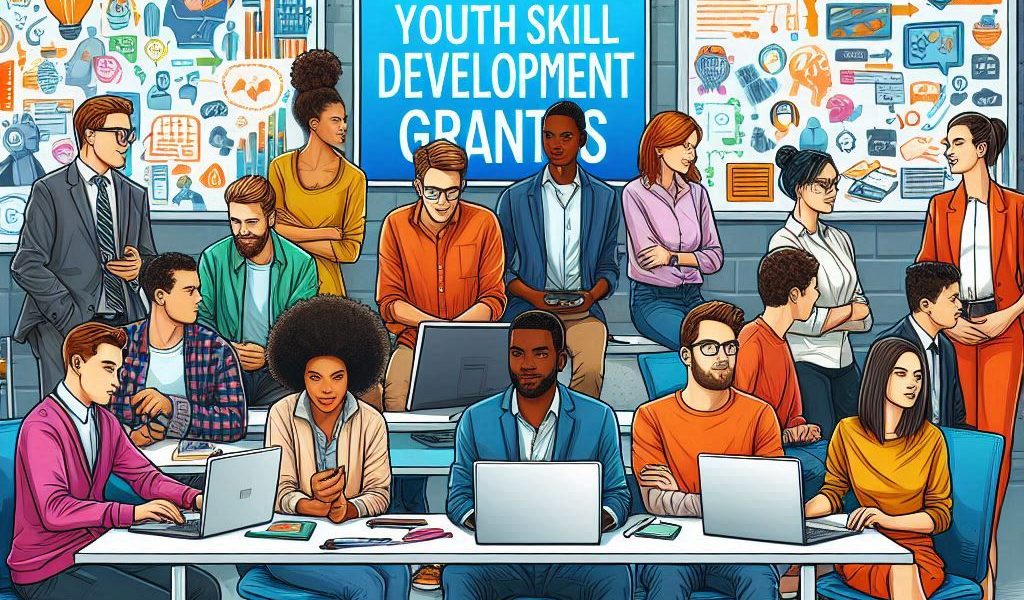Youth & Skill Development Grants: Financial Support for Training & Entrepreneurship
Youth unemployment and underemployment are significant challenges faced by many nations worldwide. As the global economy continues to evolve, the demand for highly skilled workers in various sectors is growing, particularly in technology, green energy, healthcare, and entrepreneurship. Governments recognize the importance of empowering young people through skill development and training programs. To address this issue, many governments offer youth and skill development grants that provide financial support to individuals and organizations working to enhance the skills and entrepreneurial capabilities of young people.
In this blog, we’ll explore what youth and skill development grants are, how they work, and how young individuals and organizations can apply for these valuable subsidies. Additionally, we’ll highlight the benefits these grants offer to the youth and society at large. Whether you’re a young individual seeking to advance your career or a training organization looking to support youth development, this guide will provide valuable insights to help you take full advantage of these opportunities.
What Are Youth & Skill Development Grants?
Youth and skill development grants are financial aids provided by governments, non-governmental organizations (NGOs), and international institutions to support training, education, and entrepreneurial initiatives that empower young people. These grants aim to equip the younger generation with the necessary skills and knowledge to succeed in a rapidly changing job market.
These grants often focus on:
- Vocational Training: Practical skills and technical training to enhance employability in sectors such as construction, manufacturing, agriculture, and services.
- Entrepreneurship Programs: Encouraging young people to start their own businesses by providing financial support, training, mentorship, and resources.
- Digital Literacy and Tech Training: With the rise of digital technology, grants are often targeted towards helping young individuals gain expertise in coding, software development, data analytics, and other tech-related fields.
- Leadership and Soft Skills Development: Grants also support programs that focus on enhancing leadership abilities, communication skills, and emotional intelligence, which are crucial for success in the workplace.
Why Are Youth & Skill Development Grants Important?
1. Reducing Youth Unemployment
One of the primary goals of these grants is to combat youth unemployment. By providing financial assistance for training and education, young individuals are better prepared to meet the demands of the job market. With the right skills, they are more likely to secure stable and rewarding employment opportunities.
2. Encouraging Entrepreneurship
Youth grants that support entrepreneurship are crucial in fostering innovation and job creation. They provide the necessary resources for young entrepreneurs to turn their ideas into successful businesses. By supporting entrepreneurial initiatives, governments are not only addressing unemployment but also contributing to the economic growth and diversification of their countries.
3. Closing the Skills Gap
There is a growing skills gap in many industries, where job openings remain unfilled because potential candidates lack the necessary skills. These grants address the skills gap by offering targeted training programs that match current industry needs, helping young people become job-ready and competitive in the labor market.
4. Promoting Social Inclusion
These grants also contribute to social inclusion by providing equal access to education and skill development for disadvantaged youth, including those from low-income backgrounds or underrepresented communities. With the right support, young people can break out of cycles of poverty and marginalization.
Types of Youth & Skill Development Grants
Several types of youth and skill development grants are available, each targeting different aspects of training and entrepreneurship. Here’s a breakdown of the most common types:
1. Government Grants for Youth Skill Training
Government grants aimed at youth skill development focus on improving technical skills, vocational training, and employment opportunities. These programs are typically offered by national or regional government agencies. For example:
- Youth Employment and Skill Development Initiatives: Programs that help youth acquire industry-specific skills that improve employability in fields such as construction, healthcare, and retail.
- Technical Assistance Programs: Support for specialized training in areas like computer programming, engineering, and trade-related skills.
2. Entrepreneurship Grants for Young Entrepreneurs
Entrepreneurship grants are designed to support young individuals who want to start their own businesses. These grants may offer:
- Seed Funding: Initial capital to launch a startup.
- Business Development Assistance: Resources for business planning, mentoring, and networking.
- Incubation and Acceleration Programs: Mentorship and guidance for young entrepreneurs looking to scale their businesses.
3. Scholarships and Educational Grants
Some grants focus on educational support, helping youth gain formal qualifications in various fields. Scholarships and educational grants may cover tuition fees for college, vocational schools, or online courses.
4. Industry-Specific Grants
Many grants are focused on specific industries or sectors such as technology, green energy, and healthcare. These grants aim to develop youth skills in high-demand industries. Examples include:
- STEM Grants (Science, Technology, Engineering, and Mathematics): Support for young people interested in pursuing careers in tech or scientific fields.
- Green Skills Grants: Programs that provide training related to sustainability and renewable energy.
How to Check Your Eligibility for Youth & Skill Development Grants
Eligibility for youth and skill development grants varies depending on the program. However, there are several general criteria that applicants should keep in mind when checking for eligibility:
1. Age Requirements
Many grants specifically target youth, usually individuals between the ages of 18 and 35. Some programs may have a more specific age range, so it’s important to review the criteria to ensure eligibility.
2. Educational Background
For certain grants, applicants may need to have completed a minimum level of education, such as high school or a bachelor’s degree. Some programs focus on vocational training, while others may be open to those with advanced academic qualifications.
3. Geographic Location
Some grants are specific to certain regions or countries. Applicants must ensure that the program they are interested in is available in their location.
4. Business Status
If applying for an entrepreneurship grant, you may need to provide details about your business’s stage of development. For example, some grants support early-stage startups, while others may target more established businesses looking to expand.
5. Sector-Specific Criteria
Certain grants are only available to youth pursuing careers in specific sectors, such as technology, healthcare, or green energy. Make sure to check whether your field of interest is covered by the program.
How to Apply for Youth & Skill Development Grants
The process of applying for youth and skill development grants typically involves the following steps:
1. Research Available Grants
The first step is to thoroughly research available grants. Start by visiting government websites, NGO portals, and organizations that support youth development. Some websites provide a list of grants, including eligibility requirements and application procedures.
2. Prepare the Required Documentation
Once you’ve identified a suitable grant, gather all the required documents, including:
- A completed application form.
- A detailed business plan (for entrepreneurship grants).
- Proof of age and identity.
- Educational and professional certifications.
- A budget outlining how you intend to use the funds.
3. Submit Your Application
Ensure that you meet all the submission requirements and submit your application before the deadline. Some programs may require online submission, while others may require hard copies to be mailed.
4. Follow Up and Stay Informed
After submitting your application, keep track of the status of your application. Some programs may conduct interviews or require additional documentation before approval. It’s important to stay proactive and follow up if necessary.
Conclusion: Unlocking Opportunities for Youth through Skill Development Grants
Youth and skill development grants provide essential support for young individuals and organizations aiming to develop critical skills, start businesses, or further their education. These grants help reduce unemployment, close the skills gap, and foster innovation in industries that are essential for a nation’s economic growth.
If you are a young person looking to develop new skills, enhance your career prospects, or start your own business, these grants can provide the financial support and resources you need. Remember to research available programs, check your eligibility, and prepare your application carefully to maximize your chances of success.
By empowering youth with the right skills and opportunities, governments and organizations are creating a brighter, more prosperous future for the next generation.




